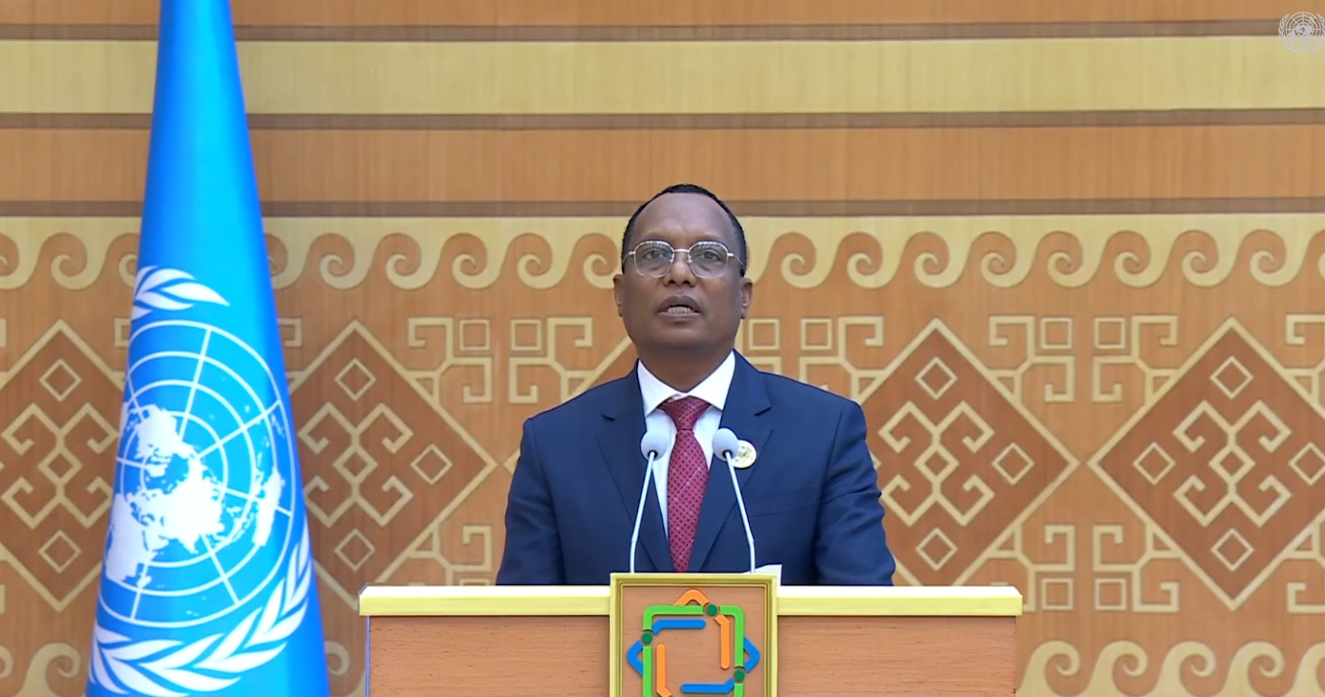Ethiopia Urges for Introduction of Paradigm Shifting Approach to Ensure Equal Maritime Rights of LLDCs - ENA English
Ethiopia Urges for Introduction of Paradigm Shifting Approach to Ensure Equal Maritime Rights of LLDCs

Addis Ababa, August 6, 2025 (ENA) -- Ethiopia has stressed the need to advocate for a renewed commitment to an inclusive, transparent and effective global partnership to enable Landlocked Developing Countries to overcome their unique challenges and achieve their full potential for sustainable development.
The Third United Nations Conference on Landlocked Developing Countries (LLDC3) opened in Awaza, Turkmenistan, bringing together global leaders, policymakers, and stakeholders under the theme "Driving Progress through Partnerships".
This landmark event aims to address the unique challenges faced by the world’s 32 landlocked developing countries, home to over 600 million people, and accelerate sustainable development through enhanced cooperation, trade facilitation, and infrastructure investment.
In his address to the meeting, Ethiopia’s Minister of Transport and Logistics, Alemu Sime, underscored that landlocked developing countries continue to face heightening challenges, including a lack of direct access to the sea, high transportation cost, and inadequate infrastructure. Geopolitical tensions, climate change, and high debt burden further compound these challenges.
Ethiopia believes that the resources on the high seas, which represent roughly 50% of the planet's surface and 60% of the global ocean areas, can drive prosperity for all countries, he remarked.
“It is critical that we uphold the right of all states to guaranteed and secure access to the sea. This is a holistic right that goes beyond transit. It includes participation in maritime economic opportunities, environmental protection, and maritime security,” the minister underscored.
The full implementation of this fundamental principle is necessary for ensuring sustainable and shared development and lasting peace, Alemu said, adding that “From this conference, Ethiopia expects to see a transformative focus and renewed global commitment.”
Commending the Awaza Programme of Action for proposing the establishment of a high-level panel of experts to explore the means of implementing the equal right of all states to access the sea, Ethiopia also urges the introduction of a paradigm-shifting approach ensuring equal maritime rights for all states.
The Minister also emphasized the need to strengthen regional integration and facilitate trade by investing in infrastructure, creating connectivity among states of the same region.
Alemu also urged partners to finance project initiatives, especially in Africa, that aim at streamlining customs procedures, liberalizing access to transport and logistics markets and easing trade barriers, promoting technology and innovation, and enhancing sustainable financing.
Ethiopia further calls for a significant increase in international financing for infrastructure development, the minister underlined.
“We should advocate for a renewed commitment to an inclusive, transparent, and effective global partnership, to enable LLDCs to overcome their unique challenges and achieve their full potential for sustainable development.”
He urged development partners to support digitalization, coordinated border management, and harmonized transit regions to unlock our full potential on maritime governance.
The commitments in the Awasa Program of Action should be applied in line with the rights of all states, including equal participation in maritime economic opportunities, protection of environmental rights in shared marine spaces, and contribution to regional peace and security through collaborative maritime governance, Ethiopia’s Minister stressed.
Ethiopia reaffirmed its commitment to the full implementation of the SDGs and the Awaza Programme of Action.
The Awaza Programme of Action (APoA) for Landlocked Developing Countries (LLDCs) for the Decade 2024–2034 was adopted by the United Nations General Assembly on 24 December 2024 under resolution A/RES/79/233.
It represents a renewed and strengthened global commitment to support the development aspirations of the 32 LLDCs located in Africa, Asia, Europe, and South America.